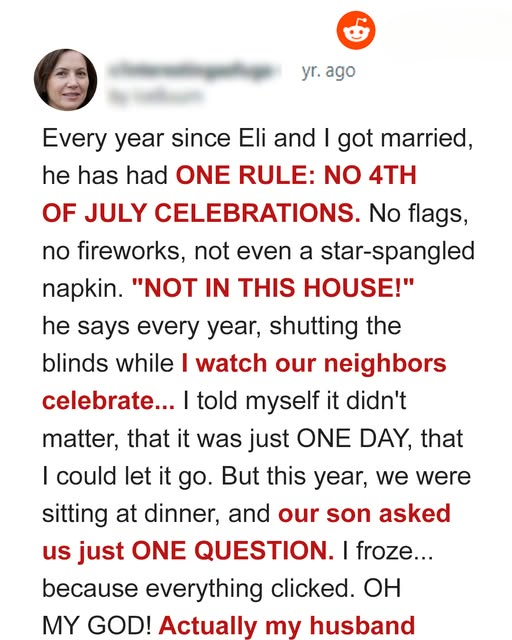
Every 4th of July, my husband strictly forbade any kind of celebration—no flags, no fireworks, not even a simple star decoration. I gave up asking why long ago. But this year, at dinner, our two-year-old son asked one innocent question… and everything we thought we knew began to unravel.
I love Eli deeply, but he can be so stubborn it makes my head spin.
As July 4th approached, everyone around us was getting into the holiday spirit.
Red, white, and blue banners draped every front porch. The grocery aisles smelled of barbecue sauce and fresh watermelon.
My friend Nancy had already posted countless photos of her patriotic fruit salad, and our neighbor Dale was proudly flying his giant eagle flag again, like he did every summer.
But not us. Not in our house.
From the moment we got married, Eli set one unwavering rule: no Independence Day festivities.
No flags. No fireworks. No sparklers. No cookouts. Not even a single decorative napkin with stars.
Once, I stuck a small flag magnet on the fridge, thinking it was harmless. Eli saw it and snatched it off like it burned his hands.
“Not in this house,” he said firmly.
I tried to ask him why, many times.
I hoped maybe after a good cup of coffee, or when our son Caleb was napping, he might finally open up. But he’d always cut me off sharply.
“Drop it, June,” he’d say, his jaw clenched so tight it looked painful.
Eventually, I stopped asking.
But this year, something changed.
Caleb had just turned two and was in that stage where every word feels like a new adventure. He loved asking questions, his little mind always hungry to learn.
That evening at dinner, as we ate chicken and corn, the distant pops of neighborhood firecrackers drifted in through the window.
Caleb paused, corn kernel halfway to his mouth. His tiny brow furrowed, and then he looked right at Eli.
“Daddy,” he said clearly, “is it true you don’t want to celebrate ’cause of your brother?”
Time stopped. My fork froze midair. Eli blinked in shock.
“Who told you that?” Eli’s voice came out sharp, almost cutting.
Caleb’s lip trembled. “Granny,” he whispered, tears filling his big eyes.
Eli went still, like the life had drained out of him. Then something shifted in his face — a darkness I had never seen before.
He leaned forward, his voice low but firm.
“That’s enough, son.”
Caleb started to cry. I rushed to scoop him up, holding him as his tiny body shook with sobs.
Eli pushed his chair back and left the room silently. I heard the old recliner creak as he sat. Then… silence.
He didn’t come back that night.
But that word—“brother”—echoed in my mind.
All these years, I thought Eli was an only child.
The next morning, Eli woke before sunrise and slipped out without a word, like he always did on the 4th.
I watched him from the window as his truck pulled away into the gray dawn.
This time, I decided I needed answers.
I walked into his office, a room so meticulously kept it felt like a museum. The air smelled of dust and old papers.
The bottom drawers were locked, but the top one slid open with a gentle pull.
Inside were yellowed envelopes, faded army forms, and two old photo albums.
The first was full of familiar family pictures. But the second one was different.
On the first page, there was a photo that stole my breath.
Two young soldiers, arms around each other, laughing without a care.
One was Eli, looking so much lighter and younger. The other man was a stranger.
On the back, it said: “Eli & Mason. July 4, 2008. Camp Maddox.”
Underneath was an address, written shakily.
Mason.
Not a brother by blood, but clearly family in a deeper way.
I didn’t tell anyone. I packed a small bag, left Caleb with my sister, and set out alone.
The address took me down winding roads, past fields and quiet farms, and finally to a cemetery.
I stepped through the iron gates, my heart pounding as I followed the row numbers.
And there he was.
Eli sat alone on a wooden bench, his shoulders hunched, face buried in his hands.
I approached quietly.
“I found you,” I said softly.
He looked up, his eyes red and swollen. “I didn’t want you to,” he whispered.
I sat next to him.
In front of us stood a clean, white headstone.
Mason J. Ryland.
“I thought you didn’t have a brother,” I said.
“I don’t,” Eli replied, staring at the grave. “But he was my brother all the same.”
After a long silence, he finally spoke.
He told me about Mason — how they met in training, how they protected each other, laughed together, survived together.
On the 4th of July, Mason wanted to see fireworks, to feel closer to home. They snuck away. An explosion went off. Mason pushed Eli out of harm’s way and took the full blast.
“He saved me,” Eli whispered, voice trembling. “I come here every year to remember. I can’t celebrate when he’s gone.”
I squeezed his hand gently.
“He wouldn’t want you to carry this pain forever,” I said. “You’re alive because of him. You owe it to him to live, to let Caleb know what real love and sacrifice mean.”
That night, we sat on the lawn together for the first time on the 4th.
Caleb danced around with a sparkler, giggling.
I saw Eli in the doorway, watching us. Slowly, he stepped outside, sat beside me, and took Caleb’s tiny hand.
Together, they lit the sparkler.
As the first fireworks lit up the sky, Eli didn’t flinch.
Instead, for the first time in years, he smiled.